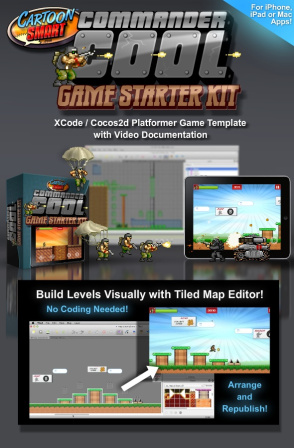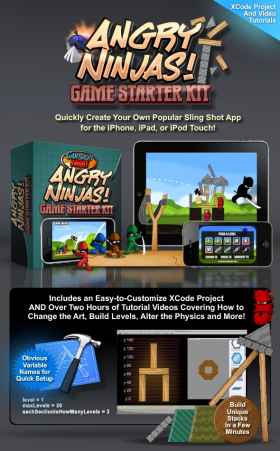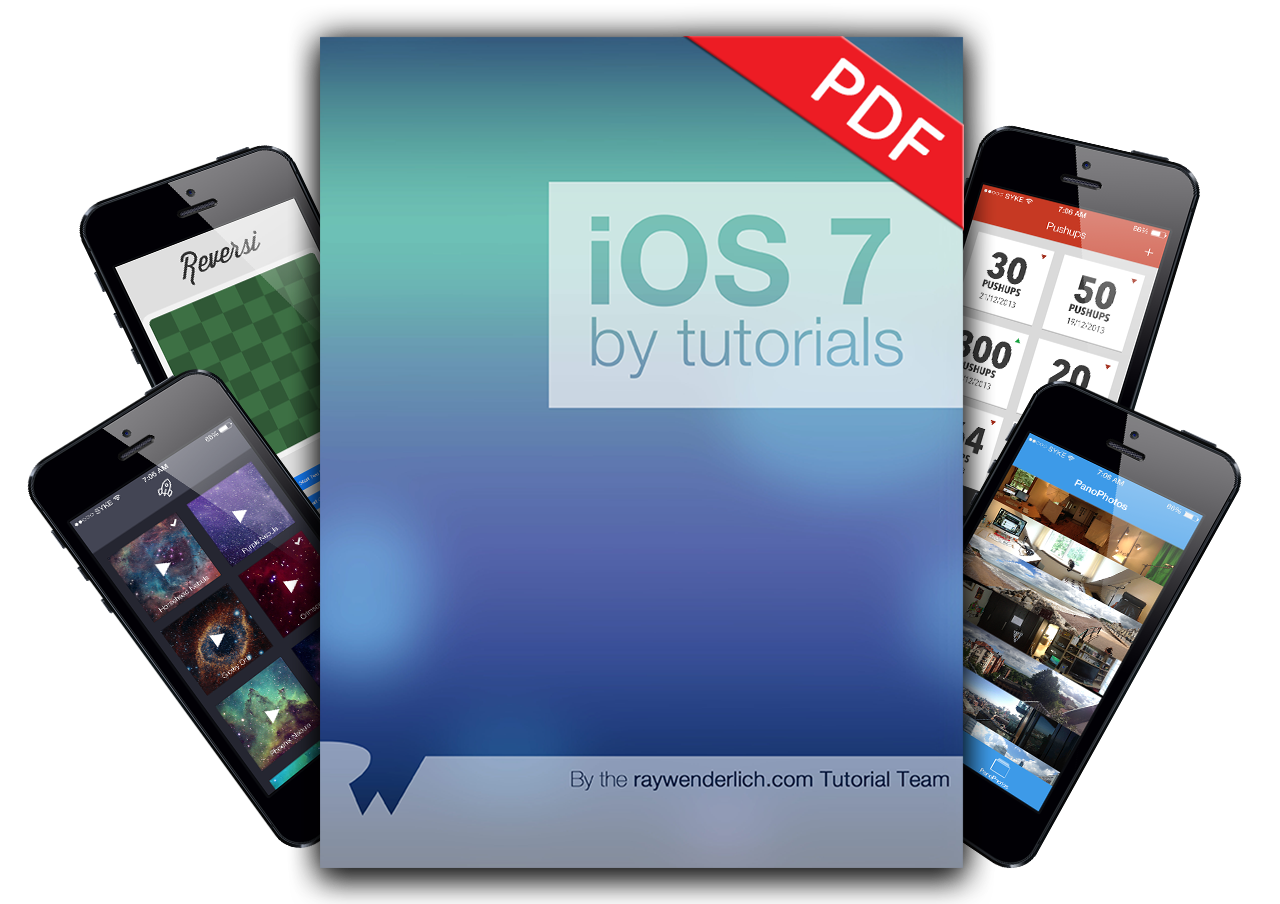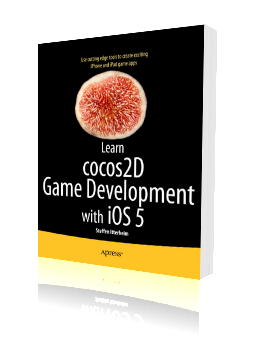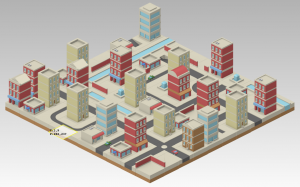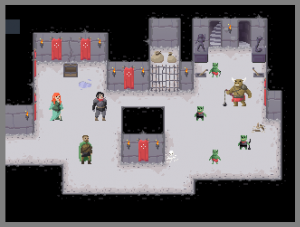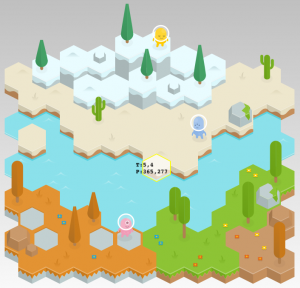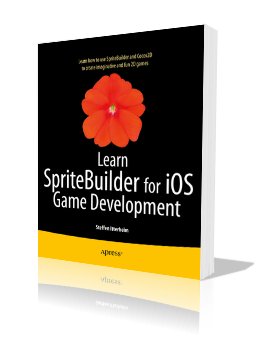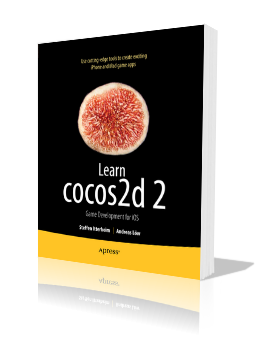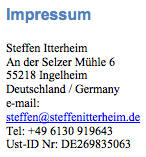I did not create the following products. But I help sell them through ads and affiliate links because they’re high quality and highly recommended. I get a commission for each sale made through these links, which in turn helps me spend more time on this website and on Kobold2D.
Paralaxer Platformer Game KitParalaxer runs on iOS, Android, Windows, & Mac using the same C++ game code. Thanks to the ultra-awesome, open-source Cocos2D-X game engine, Paralaxer is a cross-platform platformer. |
The iPhone RPG EngineRapidly create your own RPG or action-adventure game with this complete starter kit. Includes an ebook, game source code and a royalty-free art package. |
|
Commander Cool Game KitThis starter kit includes the complete source code of “Commander Cool” for iPhone / iPad / Mac build with Cocos2d & Box2d, extensive code documentation and video documentation (accessible online or offline) covering every beginning step to modifying the app for yourself. |
Angry Ninjas Starter KitRide the wave of success that sling shot games are seeing in the App Store and create your own popular game. All thats required is a bit of time on your part to build some fantastic levels and add your own artistic twist. We’ve done the hard part. Now you get to do the fun part! |
|
Visit the Ray Wenderlich Store! |
||
|
Also check out Sprite Kit by Tutorials! |
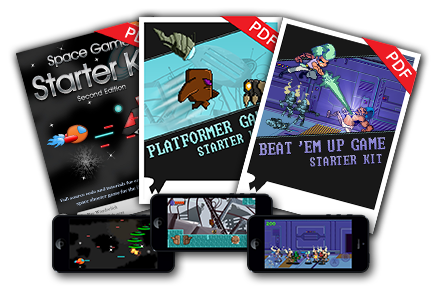 The Starter Kit Bundle: Full Cocos2D source code and tutorials for creating a side-scrolling space shooter game, a platformer game and a beat ’em up game for iPhone and iPad! |
|
|
Ray Wenderlich and his team provide awesome iOS Tutorials and excellent Starter Kit source code. |
||
TexturePackerCreate sprite sheets and optimize images for your Cocos2D, Kobold2D, Corona and other game engine projects. |
PhysicsEditorEdit collision shapes for Box2D and Chipmunk based physics games. Supports Cocos2D, Kobold2D, Corona, and other game engines. |
|
Scheduled for release on November 7th, 2011. Continue reading »
This Kobold2D FAQ article explains the difference between Corona SDK and iPhone Wax library, and evaluates the existing and future options for Lua scripting in Kobold2D.
The first Cocos2D Podcast with Mohammad Azam (@azamsharp) from HighOnCoding.com and me is now online. Refer to the Cocos2D Podcast website for show notes and web links.
Listen to the Cocos2D Podcast (36 minutes).
And here’s the iTunes link for the Cocos2D Podcast.
Addendums
… to be laid off is kind of cool.
No, that’s not a freudian slip but not the whole story either. 😀
As the layoffs hit EA Phenomic and it was disclosed to us that we’ll never be working on 3D games for PC and consoles anymore, and instead we’ll be focusing on making webgames, you’d be either in the position where you would have to be laid off (eg 3D Artists) - which admittedly wasn’t “cool”. But if you were in a position like me where you could expect to stay with the company, but you simply had no interest in making webgames, you could volunteer to be put on the layoff list. The “cool” thing about that is that you wouldn’t have to quit, which makes a big difference in terms of compensation and treatment you reveice from the company as well as getting state support for unemployment. And you could save someone else’s job who actually wanted to stay with the company. So that was just a nice way to handle an otherwise difficult situation.
Also, as far as I know almost everyone who was laid off quickly got a new job or started new careers as freelancers. Some even moved abroad to the UK and Canada to work for Ubisoft. Most went on to work for Crytek and Blue Byte. And even those who I expected were going to have a hard time getting a new job in the game industry, mostly due to lack of experience and achievements, found new employment in other game studios small and big. I find this noteworthy because whenever situations like EA Spouse, the Red Dead Redemption crunch or the layoffs and shutdowns in 2008/2009, there’s going to be a huge amount of worry expressed by employees that they don’t want to be fired because there’s no one else hiring. This couldn’t be further from the truth!
The game industry was and still is an industry where it is ridiculously easy to get a job - even with little qualification and experience - but at the same time notorious for those who “made it” to sustain the worst working conditions. This probably goes hand in hand. I know that those who landed their first game development job were very eager to keep it (me included), and they know or (even worse) suspect that there are likely better hires out there than oneself. Which in fact is sometimes reinforced by management, but my experiences trying to hire qualified staff tells a different story: it’s really, really hard to find qualified game developers which is why it’s so easy to get in because you often have no other choice but to hire from those who applied, not necessarily from those you wish would have applied. So game developers maybe trying to prove themselves harder and are more concerned about their job safety than they need to be.
Celsius / Fahrenheit
Turns out I wasn’t too far off with my guess: 25 ºC = 77 ºF
Not as hot as Texas of course, but relatively speaking a hot day for spring in germany.
Stressful
At one point I mentioned that the popularity I gained from writing the Learn Cocos2D book, plus the websites I run, can be “stressful”. I’m referring to the obligation and personal responsibility that I feel towards people seeking my help. One of the strongest negative feelings I have is looking at all those requests, knowing I can’t help all of them, and not knowing where to start answering. I don’t even have a good way to measure who needs my help the most.
Some of the questions are easy to answer, but that also means they are already answered if you go look around (google is your friend). Other questions are challenging, and I like that because they pick my brain, but answering those would require at least an hour or more of research and would seriously cut into the time I need for other tasks. And a third class of question is simply those I can’t answer, or at least not by email. That’s either because I lack the knowledge and experience on the subject matter (for example, I barely have any Cocoa Touch programming experience yet), or because it requires a fair amount of understanding of project-specific details, including design goals and the actual source code. Then there’s countless of job inquiries which as a professional I feel I should at least politely decline but even that is eating up quite a bit of time.
I feel a certain responsibility to answer everyone’s inquiries, be it about a specific programming problem or seeking someone to hire in order to get their game project done, which is why it’s so hard for me not to do it. And that in turn causes stress, or anxiety. But as I started receiving more and more of these requests I was lagging behind answering them, up to the point where I had to purposefully ignore most of the requests. I needed to face reality and cut down on the total time I spend communicating while still getting the essential tasks done (client work or the projects I set myself out to do). Though necessary to ignore most requests, to me it still doesn’t feel right, or fair, especially after I promised to be responsive. This is what creates the stress I was referring to. It’s something I have to come to terms with and I can only apologize for it.
I decided to alleviate that situation by monitoring all of these requests and figure out what the most pressing issues are, and then focus on fixing what I call the “big picture issues”, be it by programming or documenting. Kobold2D is one such effort to fix the ongoing issue of getting to work with Cocos2D (template installation, project configuration, setting up libraries). The Xcode 4 Template Documentation is my attempt to fix the information void about Xcode 4 templates, especially since every bit of information about Xcode 3 Templates is null and void due to the significant format changes.
Book Update
The contract is signed, this summer an updated version of the Learn Cocos2D book will be published. It will likely be titled “Learn iPhone 5 and iPad 2 Cocos2D Game Development” and change all the source code to be compatible with v1.0 of Cocos2D. There will also be two new chapters which will be revealed at a later time. And I’ll fix the erratas that have been reported thus far.
One of the things I want to fix is that working entirely from the book will not cause compile errors anymore, this specifically means adding some more source code to chapters 3 and 4 I believe, where I’ve omitted a few lines of code in the first edition. The Game Center chapter will be improved to include the data send/receive example. There will certainly be a couple more changes in regards to iOS 5 (if available at the time) and new devices like iPad 2 and iPhone 5 obviously, and miscellaneous changes here and there.
As usual I’ll keep you posted on the progress.
Just today I was informed that the eBook version of Learn iPhone and iPad Cocos2D Game Development is now available in its final form!
UPDATE: the source code download (also on the book’s page, left side, under Book Resources) now includes all of the source code.
The print edition will follow sometime soon, hopefully within the next ~3 weeks.
On a related note, Ray Wenderlich joined forces with Rod Strougo to help finish Rod’s Cocos2D book, due to an oddly scheduled release date whose publisher apparently feels impossible to postpone. By that I mean to say: Rod’s wife is having a baby. Congratulations to that, and the book! 
 I’m happy to announce that the cocos2d book I’m writing is now available for early access as an Alpha Book! If you click on the previous link or the image you can view the book’s description. Look for the “Buy Alpha Book” button on the left side of the book’s website, inside the “Book Details” frame.
I’m happy to announce that the cocos2d book I’m writing is now available for early access as an Alpha Book! If you click on the previous link or the image you can view the book’s description. Look for the “Buy Alpha Book” button on the left side of the book’s website, inside the “Book Details” frame.
Access to the Alpha Book costs $27,99 - the same as the eBook version. You get to read the unedited, unfinished pre-release chapters of the book. The full book isn’t available yet, but when it becomes available, you will be able to download the full eBook.
At the moment 5 chapters are available with new chapters being written on a weekly schedule.
Your feedback will be very valuable to make this book the best it can be! Please send your feedback to Apress, not to me directly. Apress will evaluate your feedback and send it to me with duplicate and already planned or implemented feedback sorted out, so that I can focus on writing.





